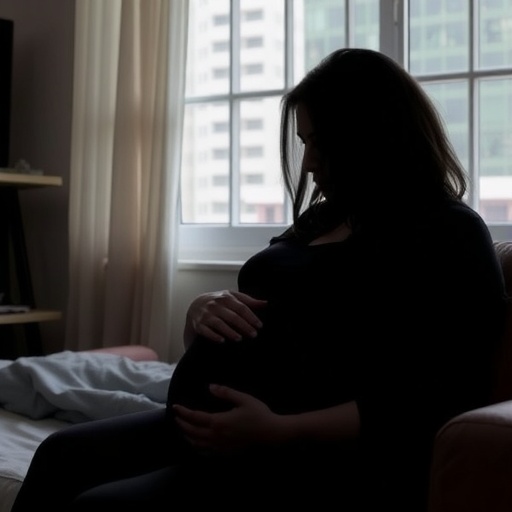A groundbreaking global study has unveiled significant mental health and neuropsychiatric risks associated with hyperemesis gravidarum (HG), a severe condition characterized by extreme nausea and vomiting during pregnancy. Conducted by researchers at King’s College London and the South London and Maudsley NHS Foundation Trust, this extensive retrospective cohort study analyzed the health records of 476,857 pregnant women diagnosed with HG, sourced from 135 healthcare institutions across 18 countries. This investigation marks the first large-scale effort to systematically evaluate a broad spectrum of neuropsychiatric outcomes linked to HG.
Hyperemesis gravidarum is a debilitating pregnancy disorder affecting up to 3.6% of all pregnancies worldwide and remains the leading cause for hospital admission in the first trimester. Unlike typical morning sickness, HG’s severity often leads to profound dehydration, significant weight loss, and electrolyte imbalances. Such physical symptoms have long been known to impact quality of life, yet the scope of associated mental health complications had not been thoroughly quantified until now. This new research reveals the intricate and multifaceted relationship between HG and adverse neuropsychiatric outcomes, emphasizing that the burden of this disorder extends well beyond physical distress.
The team utilized the TriNetX Global Collaborative Network, a powerful data platform aggregating anonymized electronic health records from diverse populations worldwide. By retrospectively examining these vast datasets, the scientists were able to track neuropsychiatric and mental health diagnoses emerging within a year following a formal HG diagnosis. Their comprehensive analysis identified a startling increase in the prevalence of 13 distinct conditions, including severe psychiatric disorders such as postpartum psychosis and post-traumatic stress disorder (PTSD), highlighting the profound and often overlooked psychological impact of HG.
Wernicke’s encephalopathy, a neurological disorder caused by thiamine (vitamin B1) deficiency, was among the conditions with the highest increased risk. Patients with HG frequently experience malnutrition and vitamin depletion due to relentless vomiting, making them particularly vulnerable to this condition which can cause memory impairment and problems with motor coordination. Furthermore, refeeding syndrome, a dangerous metabolic disturbance that occurs when nutrition is reintroduced too rapidly after significant malnourishment, was also found to be disproportionately more common in HG patients.
Mental health disorders traditionally associated with pregnancy complications were seen at markedly elevated rates. The study reported that depression risk, particularly postpartum depression, was nearly tripled in women affected by HG. This alarming statistic underscores a critical need for mental health awareness and support throughout pregnancy and beyond. Eating disorders, another psychiatric presentation linked to HG, also demonstrated a significant rise, illustrating the complex interplay between physiological illness and mental health vulnerability in these patients.
Dr. Hamilton Morrin, a Doctoral Fellow at the Institute of Psychiatry, Psychology and Neuroscience at King’s College London, emphasized the gravity of these findings. He noted that while mild nausea and vomiting are often normalized as part of pregnancy, hyperemesis gravidarum represents a severe spectrum with debilitating consequences. His remarks highlight the urgent necessity for clinicians to recognize and address not only the physical but also the severe psychiatric sequelae that may follow HG, including psychosis and eating disorders, conditions that require immediate and specialized intervention.
In addition to the neuropsychiatric insights, the study investigated the relationship between HG severity—classified in the International Classification of Diseases, 11th Revision (ICD-11)—and mental health outcomes. HG is divided into “mild HG” and “HG with metabolic disturbance,” the latter indicating a more physically severe form marked by dehydration, electrolyte imbalance, and carbohydrate depletion. Interestingly, contrary to expectations, women with HG accompanied by metabolic disturbance exhibited a significantly lower risk of depression compared to those with mild HG. This paradox suggests that the severity of physical symptoms does not directly equate to the degree of mental health impact.
Such findings carry profound implications for clinical practice. Dr. Morrin pointed out that while the ICD-11 classification effectively identifies physical health risks requiring medical treatment, it may inadequately flag women at heightened risk of adverse mental health outcomes. This disconnect underscores a pressing need for integrated care approaches that simultaneously address both the somatic and psychiatric aspects of hyperemesis gravidarum to optimize maternal wellbeing.
Dr. Thomas Pollak, Clinical Reader and Consultant Neuropsychiatrist at King’s College London, further contextualized the study’s revelations. He remarked on a historical gap between the medical community’s perception of HG’s mental health burden and the lived experiences of women suffering from the disorder. The research now substantiates the severity of psychiatric conditions arising from HG, advocating for a holistic and multidisciplinary model of care that commences early in pregnancy to mitigate these risks.
Hyperemesis gravidarum’s complex pathophysiology may, in part, be driven by biological susceptibilities. Previous research indicated a possible molecular trigger involving the hormone growth differentiation factor 15 (GDF-15), which is implicated in appetite regulation and nausea. Elevated sensitivity to GDF-15 may predispose certain women to the extreme symptoms observed in HG, offering a potential avenue for future targeted interventions.
Beyond the immediate clinical implications, this landmark study serves as a call to action for health policymakers and practitioners alike. Awareness campaigns, enhanced screening protocols, and timely psychiatric referrals must become integral components of care for pregnant women diagnosed with HG. Addressing the neuropsychiatric complications of HG is essential not only for safeguarding maternal mental health but also for ensuring optimal developmental outcomes for children born to affected mothers.
The research was published in The Lancet Obstetrics, Gynaecology, & Women’s Health and was funded by the National Institute for Health Research (NIHR). Its findings dramatically expand the understanding of hyperemesis gravidarum, reframing this condition as not simply a physical ailment but a multidimensional health crisis affecting the very core of women’s wellbeing during pregnancy.
Subject of Research: Neuropsychiatric and mental health outcomes associated with hyperemesis gravidarum in pregnant women
Article Title: Neuropsychiatric and mental health outcomes in hyperemesis gravidarum: A retrospective cohort study
Web References: https://www.nature.com/articles/s41586-023-06921-9
References: Published in The Lancet Obstetrics, Gynaecology, & Women’s Health
Keywords: Hyperemesis gravidarum, neuropsychiatric disorders, postpartum depression, Wernicke’s encephalopathy, pregnancy, mental health, GDF-15, refeeding syndrome, maternal health, ICD-11, eating disorders, psychosis




